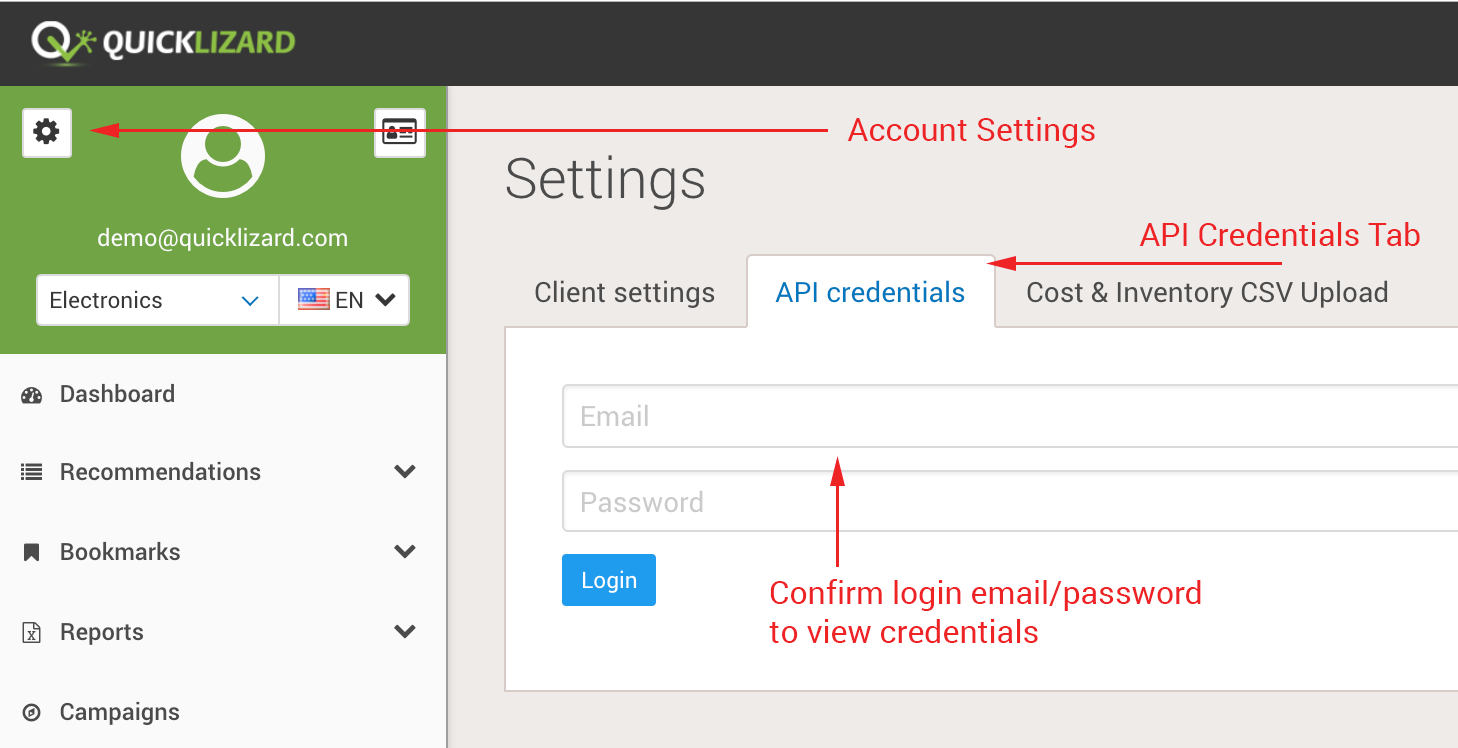# Quicklizard REST API - Authentication
To authenticate any API calls to the Quicklizard REST API, you must sign each request using the API credentials associated with the store's data you wish to access over the API.
# API Key Pair
Your API credentials are made of two long strings, that are used together to sign and issue calls to our REST API. The public part of your key-pair is called an API_KEY, while the private part of the pair is called an API_SECRET.
As the names imply, the API_KEY can be safely shared and passed around in requests, while the API_SECRET must be kept safe from prying eyes.
# Accessing your API Credentials
Your API Key / Secret pair are available on Quicklizard's online platform, in the "Client Configuration" Screen. To protect your API credentials, you must reconfirm your login email and password to view them.

# Time-stamping your request
To avoid request-replay attacks by 3rd-parties, you are required to pass a timestamp as part of the request query string with each request made to our API. This timestamp is used to ensure that the request was made within a 3 minutes window. Requests with stale or malformed timestamps will be denied.
Timestamps should be a UTC Unix timestamp in milliseconds* and should be passed as in the query-string as the value of qts parameter.
For example, calling /api/v1/dummy?paramA=1¶mB=2 should be done using the following URL - /api/v1/dummy?paramA=1¶mB=2&qts=1414562585331
# Signing your requests
For the purpose of this example, let's assume your API key-pair contains the following strings:
- API_KEY -
ccae6d912a41bfefd569a77b5cd86603cde92e53cdd45813cba9e5bf080b3734 - API_SECRET -
0d66f4f97239b4530a5ab226eede766657933948c4fdd1ea22e14773c8342ee5
Let's assume you wish to make an API call to an imaginary end-point /api/v1/dummy?paramA=1¶mB=2.
Before issuing the request, you need to generate a request signature, and pass that signature as part of the request headers.
To create the request signature, you need to create a SHA256 digest of the request path, request query-string and request body and salt it with your API_SECRET as follows:
# Example signature generation (Ruby)
SHA256.hexdigest(request-path + query-string + request-body + API_SECRET)
# Creating the signature
The API end-point /api/v1/dummy?paramA=1¶mB=2 is made up of the following components:
- Request path -
/api/v1/dummy - Query-string -
paramA=1¶mB=2
Therefore, the request signature would be:
SHA256.hexdigest(
"/api/v1/dummy" +
#we added the `qts` parameter to the query-string so the request is timestamped
"paramA=1¶mB=2&qts=1414562585331" +
"0d66f4f97239b4530a5ab226eede766657933948c4fdd1ea22e14773c8342ee5"
)
The above example will generate a the following signature: 9f910f3354fd28e4d9b54d902ed881c8e5a912337bce02d51d5f24a1755b552d
# Using the signature
Once we signed our request components using the above method, we can use the signature in our API call, by passing it in the custom HTTP header API_DIGEST.
If we were to use cURL as our HTTP client, our API call would look like this:
curl -XGET -H 'API_KEY: ccae6d912a41bfefd569a77b5cd86603cde92e53cdd45813cba9e5bf080b3734' \
-H 'API_DIGEST: 9f910f3354fd28e4d9b54d902ed881c8e5a912337bce02d51d5f24a1755b552d' \
'https://api.quicklizard.com/api/v1/dummy?paramA=1¶mB=2&qts=1414562585331'
# API Signature Checklist
You should note the following when signing the request:
- Order is important. Please concat the request components in the following order: path + query-string + request-body + API_SECRET.
- If your request doesn't have a body (usually GET requests), do not add the body to the concatenated string above.
- Similarly, if your request doesn't have a query-string (usually POST/PUT), do not add it to the concatenated string above.
- Your API_SECRET should always come last in the concatenated string.
- Do not forget to timestamp your request, by adding the qts parameter to either your query string or request body
# JSON Request Payload
When making POST and PUT requests, you may pass the request payload as JSON instead as a query-based request form.
To create an API signature for JSON payload, you must do the following:
- Use the JSON payload string as the request body signature part
- Pass the
qtsquery-string parameter in the query string and not as part of the JSON payload
For example, to sign a POST request to /api/v1/dummmy with the JSON payload {"field":"value"}
you should create a request signature as follows:
SHA256.hexdigest(
'/api/v1/dummy' + # request path
'qts=1414562585331' + # request query-string (contains only qts)
'{"field":"value"}' + # request JSON payload as string
'0d66f4f97239b4530a5ab226eede766657933948c4fdd1ea22e14773c8342ee5' # API secret
)
# API Client Libraries
For your convenience, we created client libraries that simplify the use of our API by wrapping the authentication logic and HTTP request flow. These libraries are small enough to simply drop into your codebase and use without worrying about external dependencies.
Please take a look at our Bitbucket repo (opens new window) for more information.
# Code Examples
Below are examples on how to generate an API digest in different programming languages.
# Ruby
require 'digest'
require 'uri'
api_secret = '0d66f4f97239b4530a5ab226eede766657933948c4fdd1ea22e14773c8342ee5'
uri = URI('https://api.quicklizard.com/api/v1/products?page=1')
qts = Time.now.utc.to_i * 1000 #ruby time is in seconds, so we convert to ms by multiplying it by 1000
uri.query += "&qts=#{qts}" #append qts to query-string
digest = Digest::SHA256.hexdigest("#{uri.path}#{uri.query}#{api_secret}")
puts "Digest: #{digest} | API URL: #{uri.to_s}"
# PHP
$api_secret = '0d66f4f97239b4530a5ab226eede766657933948c4fdd1ea22e14773c8342ee5';
$uri = parse_url('https://api.quicklizard.com/api/v1/products?page=1');
$qts = time() * 1000;
$query = $uri['query'].'&qts='.$qts;
$digest = hash('sha256', $uri['path'] . $query . $api_secret);
$url = $uri['scheme'] . '//' . $uri['host'] . $uri['path'] . '?' . $query;
echo 'Digest: ' . $digest . ' | API URI: ' . $url;
# Java
import java.io.UnsupportedEncodingException;
import java.net.URI;
import java.net.URISyntaxException;
import java.security.MessageDigest;
import java.security.NoSuchAlgorithmException;
import java.util.Calendar;
import java.util.TimeZone;
try {
String url = "https://api.quicklizard.com/api/v1/products?page=1";
String apiSecret = "0d66f4f97239b4530a5ab226eede766657933948c4fdd1ea22e14773c8342ee5";
long ts = Calendar.getInstance(TimeZone.getTimeZone("UTC")).getTimeInMillis();
URI uri = new URI(url);
String path = uri.getPath();
String queryString = String.format("%s&qts=%d", uri.getQuery(), ts);
String rawDigest = String.format("%s%s%s", path, queryString, apiSecret);
MessageDigest md = MessageDigest.getInstance("SHA-256");
byte[] hash = md.digest(rawDigest.getBytes("UTF-8"));
StringBuffer hexDigest = new StringBuffer();
for (int i = 0; i < hash.length; i++) {
String hex = Integer.toHexString(0xff & hash[i]);
if(hex.length() == 1) hexDigest.append('0');
hexDigest.append(hex);
}
String apiDigest = hexDigest.toString();
URI apiURI = new URI(uri.getScheme(), uri.getUserInfo(), uri.getHost(), uri.getPort(), uri.getPath(), queryString, uri.getFragment());
} catch (URISyntaxException e) {
e.printStackTrace();
} catch (NoSuchAlgorithmException e) {
e.printStackTrace();
} catch (UnsupportedEncodingException e) {
e.printStackTrace();
}